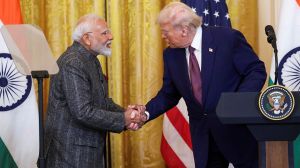The lull after the storm
In response to last week8217;s piece in this column about the shameful indifference of most Indians to the plight of their fellow citizens,...

In response to last week8217;s piece in this column about the shameful indifference of most Indians to the plight of their fellow citizens, I received many indignant letters from many self-righteous readers. Some accused me of being 8216;8216;anti-Hindu8217;8217; for suggesting that the individual spiritual quest of the Hindu tradition was at the crux of the problem. Some said I had not done my research well enough or I might have noticed how wholehearted the response to the tsunami disaster has been compared to past disasters. Some said I was wrong about young Indians being particularly unconcerned and sent me names of student organisations doing good works they would not fill a page and some pointed out that more money had been collected from private donations than ever before. It has. As this newspaper reported last week, money collected by the Prime Minister8217;s Relief Fund is a 8216;8216;whopping Rs 340 crore8217;8217; already. It took a year to collect Rs 410 crore after the Gujarat earthquake and the Orissa cyclone in 1998 attracted a paltry Rs 125 crore. Despite this, I stand by what I wrote. I believe we are an especially unconcerned, uncaring people, which is why our officials get away with cosmetic gestures when there should be concrete effort.
Here is an example from last week. On the day that the Prime Minister made the grand gesture of donating his monthly cheque of Rs 40,000 to his own relief fund, the collector of a southern Indian town called Kollam went on television to ask ordinary citizens to donate pots and pans and gas canisters to the relief effort. Excuse me? Is Rs 340 crore not sufficient to buy pots and pans for every tsunami victim? Are the Government8217;s granaries not bursting with enough foodgrain to set up free kitchens at every street corner in every affected village and town? Are there not enough volunteers, leave alone government employees, who can man these kitchens?
The victims do not need the Prime Minister8217;s salary, what they need is for his officials to be more sensitive to the terrible ordeal they have suffered. Had they been, there would not have been reports of women who have lost husbands and children to the killer waves now being shunted from government office to government office by officials demanding documentary proof of their losses. Death certificates? How? When so many people have simply disappeared is it not possible to find a more sensitive way of dealing with the situation? Of course there is but Indian officials will not bother to find it because they know that in a few weeks the fuss over the tsunamis will have died down and then there will be nobody to see where the money is going.
Is that not what happened after the Bhopal gas tragedy? That was 20 years ago and is it not true that it is only a few months ago that full compensation was paid to the victims? Had it been paid at the time of the tragedy it would have gone a long way to ease the suffering of people who lost families, their livelihood and their health to a tragedy that would not have happened if Indian officialdom was less indifferent to the suffering of ordinary Indians.
It is, alas, an indifference we share. The response to the Bhopal disaster has been tokenism of the worst kind. On every anniversary a few so-called environmentalists have flown down to the city to give television interviews and appear to speak on behalf of the victims. What have they done to ensure that a disaster like Bhopal never happens again? Nothing. What have they done to ensure that those guilty of taking dangerously unsafe short cuts in the Union Carbide factory were punished? Nothing. Has anyone been punished?
Bhopal is only one example. After every disaster, manmade or natural, there is a huge fuss for a short while and then we all forget and this includes us in the media. If we did not there is no way that our governments could have got away with decades of criminal negligence in the social sector. Our standards of public healthcare, education and social welfare are among the worst in the world. Do we care? No. It does not affect us. We can afford private schools and private hospitals and our children do not get picked up and locked up in children8217;s homes that are worse than prisons.
Last week some streetchildren I know were arrested on Marine Drive as they waited for a bus to take them to the Salaam Baalak Centre. Their parents fall in the 8216;poorest of poor8217; category, the children have spent their whole life on the streets, so a roof over their heads and two square meals a day should, you would imagine, be an improvement in their standard of living. It is not. The average state-run children8217;s home is a place of such exploitation and brutality that those children unfortunate enough to experience the government8217;s idea of 8216;social welfare8217; spend their entire time trying to escape. How many times have you heard politicians, NGOs, social workers or even journalists raise the issue? We live in a country in which nearly 30 per cent of the population lives on less than Rs 10 a day in living conditions so degraded that they could be described as being permanently tsunami affected. How many of you who wrote me those self-righteous letters have noticed or care?
Write to tavleensinghexpressindia.com
- 01
- 02
- 03
- 04
- 05































